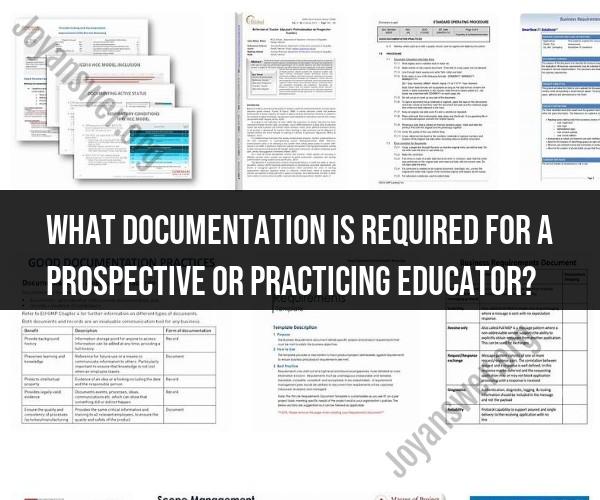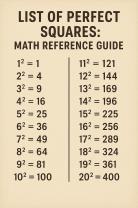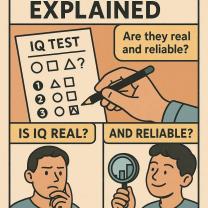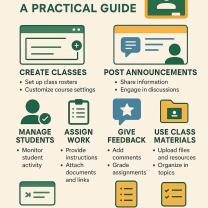What documentation is required for a prospective or practicing educator?
The documentation required for prospective and practicing educators can vary significantly depending on the country, state, or educational institution, as well as the specific role and level of education being pursued or practiced. However, there are some common types of documentation that educators may need to provide or maintain. Here is a general overview:
For Prospective Educators:
Educational Credentials:
- Transcripts from colleges or universities showing completed coursework and degrees earned.
- Teaching certificates or licenses, if applicable.
Teaching Portfolio:
- A portfolio showcasing teaching philosophy, sample lesson plans, and evidence of classroom experience, if available.
Background Checks:
- Criminal background checks and clearance certificates, often required for employment in educational settings.
References:
- Letters of recommendation from professors, mentors, or individuals who can speak to your suitability for a teaching role.
Teacher Preparation Program Documentation:
- If you completed a teacher preparation program, documentation of program completion and any required assessments.
Test Scores:
- Scores from standardized tests, such as the Praxis Series, if required for teacher certification.
Resumes and Cover Letters:
- A well-crafted resume and cover letter highlighting your qualifications and interest in the field of education.
For Practicing Educators:
Teaching Credentials:
- Current teaching certificates or licenses, which may require periodic renewal.
Professional Development Records:
- Documentation of continuing education, workshops, conferences, or courses completed to maintain teaching credentials.
Performance Evaluations:
- Copies of performance evaluations conducted by school administrators or supervisors.
Student Records:
- Records of student grades, attendance, and assessments, depending on the educator's role.
Professional Memberships:
- Documentation of memberships in professional organizations related to education.
Evidence of Impact:
- Documentation showcasing the educator's impact on student learning, which may include student work, assessment data, or project outcomes.
Background Checks:
- Periodic background checks or clearances, as required by the educational institution or jurisdiction.
Professional Development Plans:
- Documentation of plans for ongoing professional development and improvement.
Curriculum Materials:
- Copies of curriculum materials, lesson plans, and instructional resources used in the classroom.
Teaching Portfolios:
- Updated teaching portfolios with evidence of professional growth and contributions to the field.
It's important to note that the specific documentation requirements can vary based on factors such as the level of education (e.g., early childhood, elementary, secondary, higher education), the subject area, and the location (state, country). Educators should consult with their local education authorities, school districts, or educational institutions to ensure they meet all applicable documentation and certification requirements. Additionally, educators should keep their documentation up-to-date throughout their careers to maintain their credentials and stay current with professional standards.
Navigating Documentation Requirements for Prospective and Practicing Educators
Educators are required to maintain a variety of documentation throughout their careers. This documentation can be used for a variety of purposes, such as:
- Applying for teaching jobs
- Renewing teaching licenses
- Evaluating teaching performance
- Supporting professional development
- Demonstrating compliance with regulations
Educators should be familiar with the documentation requirements in their state or province. This information can be found on the website of the state or provincial department of education.
Essential Documents for Aspiring and Active Educators
Some essential documents for aspiring and active educators include:
- Teaching license: A teaching license is a credential that demonstrates that an educator has met the minimum requirements to teach in a particular state or province.
- Resume or curriculum vitae (CV): A resume or CV is a document that summarizes an educator's work experience, education, and skills.
- Cover letter: A cover letter is a document that is submitted with a resume or CV to introduce an educator to a potential employer.
- Transcripts: Transcripts are official records of an educator's academic coursework.
- Letters of recommendation: Letters of recommendation are written by colleagues, supervisors, and other professionals who can attest to an educator's skills and abilities.
- Professional development certificates: Professional development certificates are documentation of an educator's participation in professional learning activities.
Ensuring Compliance and Professionalism in Educator Documentation
Educators should ensure that their documentation is complete, accurate, and up-to-date. Documentation should be stored in a safe and secure place. Educators should also be aware of the confidentiality requirements for their documentation.
Educators should use their documentation to demonstrate their professionalism and commitment to their students. Documentation can be used to reflect on teaching practice, identify areas for improvement, and set professional goals.
Here are some tips for ensuring compliance and professionalism in educator documentation:
- Keep your documentation organized and up-to-date. Create a system for storing your documentation that is easy to access and maintain. Make sure to update your documentation regularly to reflect your current experience and qualifications.
- Be familiar with the documentation requirements in your state or province. You can find this information on the website of the state or provincial department of education.
- Be honest and accurate in your documentation. Do not fabricate or misrepresent information.
- Keep your documentation confidential. Do not share your documentation with others without your permission.
- Use your documentation to demonstrate your professionalism and commitment to your students. Reflect on your teaching practice, identify areas for improvement, and set professional goals.












